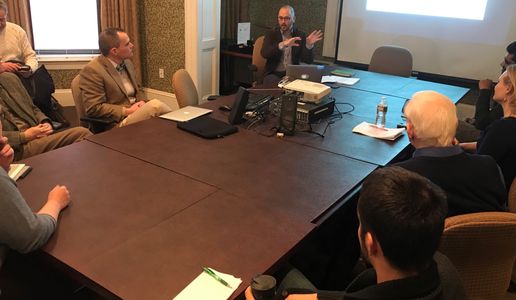Research Seminar: Menchik on Wilsonianism and Religion
Jeremy Menchik, Assistant Professor of International Relations at the Fredrick S. Pardee School of Global Studies at Boston University, gave a talk as part of the Pardee School Research Seminar Series and BU Research in Comparative Politics Workshop on February 7, 2018.
The presentation, entitled “Woodrow Wilson and the Spirit of Liberal Internationalism,” focused on Menchik’s research question examining the role of religion in Wilsonianism.
“Wilson is not only among the most influential U.S. Presidents in terms of foreign policy, he is also the most pious. He’s the son, grandson and nephew of Presbyterian preachers. His contemporaries routinely describe his faith as foundational to his worldview, not just on Sundays or as a private matter, but central to his policies,” Menchik said. “And yet Wilsonianism — a set of ideas that includes advancing world progress through U.S. leadership, support for democracy, support for open markets, national sovereignty, self-determination and sometimes disarmament — is routinely described as a set of policy prescriptions without reference to religion.”
Menchik argued that President Woodrow Wilson’s worldview and foreign policy principles need to be understood within the context of his specifically Southern Presbyterian upbringing, his admiration for other Christian internationalists, and the influence of the budding movement of the Social Gospel.
Discussing the immediate implications of his research, Menchik said that Wilson’s religiosity and its emanations have been scrubbed from theories of liberal internationalism; that more attention needs to be paid to the buried influence of religion on the discipline of international relations; and that Wilson’s racism and sectarianism are components of a large white, Protestant, American paternalism.
Menchik argued that Wilson is a Christian internationalist ratrher than just a liberal internationalist, and that ignoring the former leads to a misunderstanding of the missionary impulses that drive the latter.
“The missionary impulse can lead to ideological blinders and imperialism,” Menchik said. “The desire to spread American values can take the form of blindness about one own’s violence, parochialism, and intolerance toward alternative ways of life.”
Jeremy Menchik’s research interests include comparative politics, religion and politics, Southeast Asia, and the Middle East. At Boston University he is a member of the graduate faculty of political science and coordinates the MAIA program with specialization in Religion and International Affairs.
The Pardee School Research Seminar Series is a forum for faculty and students to discuss and receive feedback on ongoing research. The series is a mix of presentations, works-in-progress sessions, and research workshops. Faculty and students based at BU and elsewhere are invited to present and attend the Research Seminar Series. Anyone interested in presenting should send an e-mail with name, affiliation, and a presentation description, with “Pardee Seminar” in the subject line, to: Mahesh Karra or Jayita Sarkar.
